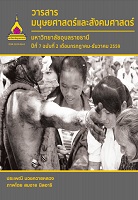ปัจจัยทำนายปริมาณไขมันในร่างกายของผู้ที่มีภาวะอ้วนลงพุง
Main Article Content
บทคัดย่อ
ภาวะอ้วนลงพุงมีความสัมพันธ์กับโรคเรื้อรังที่สำคัญ เช่น โรคหัวใจ โรคเบาหวาน ความรุนแรงของภาวะอ้วนลงพุงขึ้นอยู่กับปริมาณไขมันในร่างกาย การวิจัยครั้งนี้มีวัตถุประสงค์เพื่อศึกษาปัจจัยทำนายร้อยละของไขมันในร่างกายของผู้ที่มีภาวะอ้วนลงพุง กลุ่มตัวอย่าง ได้แก่ ผู้ที่มีภาวะอ้วนลงพุงตามเกณฑ์ของ NCEP ATP III จำนวน 262 คน เครื่องมือวิจัย ได้แก่ แบบสอบถามข้อมูลส่วนบุคคล ภาวะสุขภาพ พฤติกรรมสุขภาพ การจัดการภาวะอ้วนลงพุง สายวัดรอบเอว เครื่องชั่งน้ำหนักและวัดไขมันในร่างกาย วิเคราะห์ข้อมูลด้วยสถิติพรรณนา และ Multiple Regression ผลการวิจัย พบว่า
1. กลุ่มตัวอย่างส่วนใหญ่เป็นเพศหญิง อายุเฉลี่ย 60.19 ปี (SD =10.8) รายได้ต่อเดือนเฉลี่ย 4,941.70 บาท (SD=9868.10) จบประถมศึกษา ไม่ได้ประกอบอาชีพ มีโรคเรื้อรังและใช้สมุนไพร/อาหารเสริม
2. ปัจจัยทำนายร้อยละของไขมันในร่างกาย ได้แก่ การควบคุมน้ำหนัก (Beta =.206, p<.05) การรับประทานของขบเคี้ยว (Beta =.195, p<.05) การใช้สมุนไพร (Beta =.147, p<.05) การดูทีวีรายการสุขภาพ (Beta = -.137, p<.05) และการรับรู้ภาวะสุขภาพ (Beta =-.123, p<.05) โดยร่วมกันทำนายร้อยละของไขมันได้ร้อยละ 10.9 (p <.05)
ข้อเสนอแนะ ได้แก่ ทีมสุขภาพควรนำ ผลการวิจัยไปเผยแพร่เพื่อให้ประชาชนรับรู้ เข้าใจและมีแนวทางป้องกันภาวะอ้วนลงพุงโดยเน้นการควบคุมน้ำหนัก การลดของขบเคี้ยว การเลือกใช้สมุนไพร และเลือกดูรายการทีวีที่เกี่ยวกับสุขภาพ
Prediction of Factors of Body Fat of Metabolic Syndrome Persons
Metabolic Syndrome (MS) is an antecedent of cardiovascular diseases, diabetes mellitus, and chronic kidney disease, and represents a new threat to people’ health. Body fat is a key indicator of MS severity. The objective of this study was to explore the determinants of body fat in persons with MS. A total of 262 persons with MS were recruited using National Cholesterol Education Program Adult Treatment Panel III (NECP ATP III) criteria. Instruments included demographics, health status, health behaviors, MS management, metric tape, and scale and body fat analyzers. Results indicated that the majority of the persons was female with an average age of 60.19 (SD =10.8). They earned a low monthly income (M=4,941.70, SD=9868.10), had completed primary school, completed domestic duties, received treatment for chronic illness, and utilized herbs/complementary therapy. Findings also showed that the predicting factors of percent body fat included weight control (Beta = .206, p<.05), snack (Beta =.195, p<.05), herb utilization (Beta = .147, p<.05), receipt of TV health information (Beta = -.137, p<.05), and perceived health status (Beta =-.123, p<.05). Total variance accounted for 10.9 (p <.05). The research results suggested that health care providers should provide information about factors influencing MS, such as limiting snacks, correct selection of herbs, and knowledge about and management of the condition.
Article Details
บทความที่ได้รับการตีพิมพ์เป็นลิขสิทธิ์ของวารสารมนุษยศาสตร์และสังคมศาสตร์ มหาวิทยาลัยอุบลราชธานี
ข้อความที่ปรากฏในบทความแต่ละเรื่องในวารสารวิชาการเล่มนี้เป็นความคิดเห็นส่วนตัวของผู้เขียนแต่ละท่านไม่เกี่ยวข้องกับมหาวิทยาลัยอุบลราชธานี และคณาจารย์ท่านอื่นๆในมหาวิทยาลัยฯ แต่อย่างใด ความรับผิดชอบองค์ประกอบทั้งหมดของบทความแต่ละเรื่องเป็นของผู้เขียนแต่ละท่าน หากมีความผิดพลาดใดๆ ผู้เขียนแต่ละท่านจะรับผิดชอบบทความของตนเองแต่ผู้เดียว


